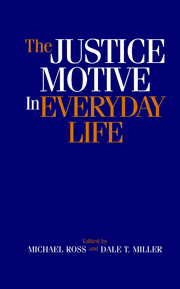Book contents
- Frontmatter
- Contents
- List of Contributors
- Introduction
- Theoretical Perspectives on the Justice Motive
- Victim Derogation and the Belief in a Just World
- The Justice Motive and Prosocial Behavior
- Justice-Based Reactions to Transgressors
- Justice and Reaction to One's Own Fate
- 20 Belief in a Just World as personal Resource in School
- 21 Awaking to Discrimination
- 22 Deservingness and Perceptions of Procedural Justice in Citizen Encounters with the Police
- 23 Fairness Judgements as Cognitions
- Name Index
- Subject Index
23 - Fairness Judgements as Cognitions
Published online by Cambridge University Press: 08 September 2009
- Frontmatter
- Contents
- List of Contributors
- Introduction
- Theoretical Perspectives on the Justice Motive
- Victim Derogation and the Belief in a Just World
- The Justice Motive and Prosocial Behavior
- Justice-Based Reactions to Transgressors
- Justice and Reaction to One's Own Fate
- 20 Belief in a Just World as personal Resource in School
- 21 Awaking to Discrimination
- 22 Deservingness and Perceptions of Procedural Justice in Citizen Encounters with the Police
- 23 Fairness Judgements as Cognitions
- Name Index
- Subject Index
Summary
Thirty years ago, at the beginning of the Thibaut and Walker project on procedural justice, the psychology of justice was a relatively cognitive undertaking. The two most prominent and active justice literatures at that time were those based on Adams's (1965) equity theory, an analysis of feelings of deservingness that was strongly grounded in Festinger's theories of cognitive dissonance and social comparison, and Lerner's just world hypothesis (Lerner, 1971, 1980; Lerner & Miller, 1978), an analysis of impression formation and judgment that had links both to cognitive balance ideas and to attribution theory. In both lines of work, unfairness and injustice were viewed as cognitive manifestations of an incongruence between ideal and experienced states of being, and the fundamental psychological processes employed to explain fairness judgment processes involved mental efforts to remedy or explain away the inconsistency. Thus, in Adams's analysis of equity judgments, people were seen as gathering information about the relative contributions and outcomes of others, and they were then seen as changing their attitudes and behavior in such a way as to make their perceptions of their own contributions and outcomes congruent with those of others. In Lerner's just world work, people were seen as struggling to reconcile the misfortunes of others with their own belief in a just world, and this reconciliation induced a derogation-of-victim effect, so that the victim's fate could be seen as deserved. In both instances, there was a fairly fine-grained analysis of the cognitive dynamics underlying the justice effects in question.
- Type
- Chapter
- Information
- The Justice Motive in Everyday Life , pp. 416 - 432Publisher: Cambridge University PressPrint publication year: 2002
- 8
- Cited by



